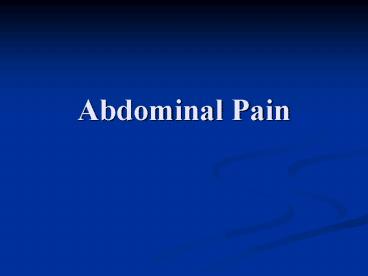Abdominal Pain - PowerPoint PPT Presentation
1 / 22
Title:
Abdominal Pain
Description:
Episodes of colicky pain may last for short durations ... Colicky pain is due to smooth muscle spasm in a hallow viscus Eg: Ureteric or intestinal colic ... – PowerPoint PPT presentation
Number of Views:76
Avg rating:3.0/5.0
Title: Abdominal Pain
1
Abdominal Pain
2
- Abdominal pain may present as a crying episode in
infants - May be difficult to identify, let alone to
localize. - Older children are able to point to the site of
pain as well as this may facilitate localization.
3
- Most of the pathological conditions present with
localized quadrant pain, while functional pain is
often periumbilical - Pain presenting for the first time may, however,
herald the onset of a recurrent pathology
4
Red Flags
- Surgical abdomen ( abdominal distension,
guarding, rigidity, absent peristalsis, lump) - Persistent vomiting / bilious vomiting
- Dehydration / shock
5
- Why ?
- Persistent vomiting may lead to dehydration.
- Bilious vomiting suggests obstruction distal to
the Ampulla of Vater
6
Red Herrings
- Torsion testes
- Basal pneumonia
- Hip joint pathology
7
Causes Acute Pain Abd.
- Less common
- Appendicitis
- Intestinal obstruction
- Peritonitis
- Renal colic
- Hennoch-Schonlein Purpura
- Common
- Intestinal colic
- Dysentery
- Hepatitis
- Gastritis
Rare Pancreatitis, Biliary colic, Meckels
diverticulum, Lead poisoning, Porphyrias, Sickle
cell crisis, Herpes zoster
8
Causes - Chronic
- Common
- Constipation
- Dyspepsia
- psychogenic
- Less common
- Colitis
- Recurrent appendicitis
- Rare
- Inflammatory bowel disease
- Abdominal migraine
- Systemic vasculitides
9
Evaluation
10
Ask
- Onset / Duration / progress / type of pain / site
of pain / aggravating and relieving factors - Vomiting
- Change in bowel pattern
- Fever
- Other symptoms
- Urinary symptoms, behavior disturbances
11
ONSET
- Sudden onset of pain (minutes / hours) may
suggest a colic. - Inflammatory pain may progress gradually
( hours / days) - Sudden screaming episodes in an infant indicate
intussusception
12
DURATION
- Episodes of colicky pain may last for short
durations - Inflammatory pain lasts longer
13
PROGRESS
- Short lasting and self - limiting pain often
indicates colic and is often recurrent - Inflammatory pain lasts longer and usually does
not recur
14
TYPE OF PAIN
- Dull ache indicates chronic pathology
- Colicky pain is due to smooth muscle spasm in a
hallow viscus Eg Ureteric or intestinal colic
15
Site of pain
- Site of pain localized to a quadrant helps to
focus attention to the organs situated in that
region - Generalized pain may be due to intestinal or
peritoneal pathology
16
Aggravating and Relieving factors
- Pain in gastritis may be related to eating
( Pain - food - relief cycle) - Colicky pain may be aggravated by movement
17
Look
- Sick or well
- Abdominal distension
- Tenderness
- Guarding / rigidity
- Hernial orifices
- Jaundice
- Abdominal lump
18
- A child suffering from acute surgical abdomen,
dysentery or pancreatitis looks sick - Generalized abdominal distension is a feature of
intestinal disease while localized distension
suggests hepatitis or localized pathology
19
- Localized tenderness denotes local inflammatory
conditions while peritonitis and intestinal
obstruction present with generalized tenderness. - Absence of tenderness may suggest
non-inflammatory pathology - Guarding and rigidity indicate inflammation of
the overlying peritoneum
20
- Jaundice may be a marker of hepatitis. It could
also indicate biliary obstruction or pancreatitis
- Abdominal lump may help localize the disease
21
Acute dysentery Acute hepatitis Appendicitis Intus
susception Peritonitis H - S Purpura
Intestinal colic Acute gastritis Renal
colic/Biliary colic Meckels diverticulum Sickle
cell disease Lead poisoning Porphyria
22
Chronic Abdominal Pain
Constipation Dyspepsia Functional
(Psychogenic) Parasitic infection Tumors Appendici
tis Irritable colon / colitis































